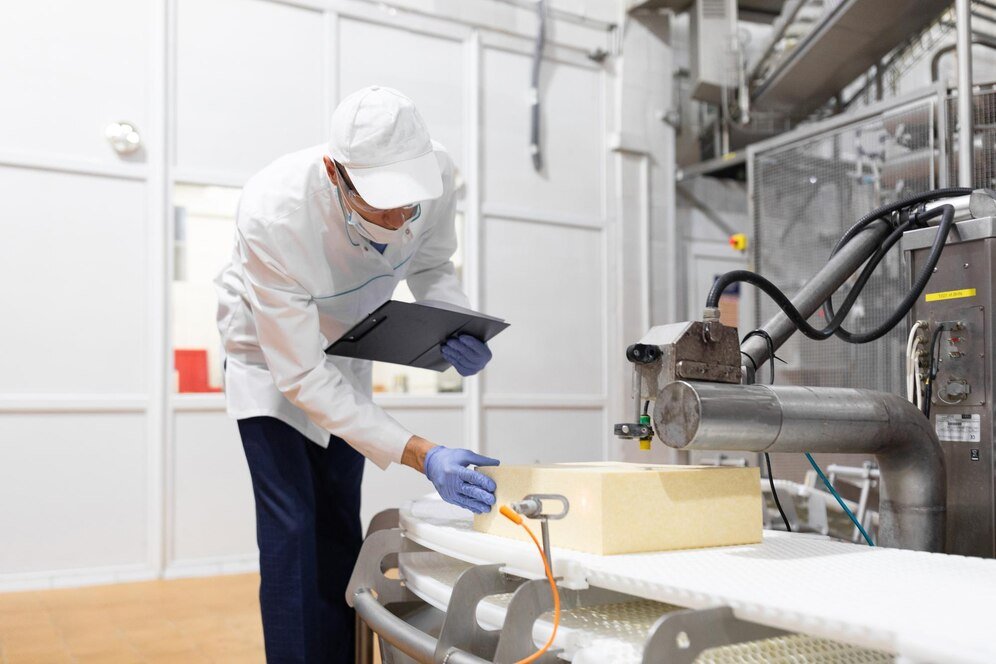As the focus on food safety and hygiene continues to grow, food manufacturers and plant managers are constantly seeking ways to enhance their processes and comply with evolving regulatory standards. One crucial yet often overlooked component in food production is the role of lubricants. Specifically, switching to food grade lubricants is becoming an essential practice for ensuring both safety and efficiency.
This article dives into why transitioning to food grade oils and food grade aerosol products is not only a smart choice for compliance but also a strategic move for optimising machinery performance and sustainability in production.
Why Switching to Food Grade Lubricants is Essential
What are Food Grade Lubricants?
Food grade lubricants are specially formulated oils and greases designed for use in food processing and packaging environments. These lubricants are engineered to meet strict safety standards, ensuring they do not pose any risk if they accidentally come into contact with food. Unlike conventional industrial lubricants, food grade options are made from non-toxic, non-reactive, and often biodegradable ingredients, making them ideal for sensitive production areas.
The Risks of Using Non-Food Grade Lubricants
Using non-food grade lubricants in food production can result in serious consequences. Industrial lubricants are made from chemicals that can contaminate food products, leading to costly recalls and legal implications. Additionally, contamination can damage a brand’s reputation and harm consumer trust. Even trace amounts of non-food-grade oils can render entire batches unsafe, underlining the importance of making the switch.
Compliance with Safety Standards
Meeting Global Safety Regulations
Regulatory bodies worldwide are tightening standards on food production to ensure consumer safety. Organisations like the FDA (Food and Drug Administration) in the US and the NSF (National Sanitation Foundation) play a key role in certifying lubricants as food-safe. Food grade oils that carry certifications like NSF H1—indicating that they are safe for incidental food contact—are crucial in ensuring your plant meets both local and global regulatory standards.
Safety Categories for Lubricants
There are different categories of food grade lubricants, each suited to specific applications:
- H1 Lubricants are used in areas where there is potential for incidental contact with food. These are essential in reducing contamination risks while maintaining lubrication effectiveness.
- H2 Lubricants are for use in areas where no food contact is expected, though they still meet the rigorous standards required in food production settings.
When selecting a food grade aerosol for lubrication tasks, understanding the right category ensures compliance and enhances the safety of your production processes.
Enhanced Equipment Performance and Durability
Maximising Machinery Efficiency
Beyond compliance, food grade lubricants offer superior performance benefits for equipment used in food production. These lubricants are formulated to withstand high temperatures, moisture, and other harsh conditions typically found in production environments. They effectively reduce friction and wear and tear on machinery, prolonging the lifespan of equipment and maintaining operational efficiency.
Long-Term Durability
Machinery used in food manufacturing often faces constant stress. Food grade oils provide excellent protection against corrosion and oxidation, ensuring that components function optimally over time. This not only prevents breakdowns but also reduces energy consumption by keeping equipment running smoothly, translating to lower operational costs.
Reducing Downtime and Maintenance Costs
Minimising Equipment Breakdowns
Regular maintenance is essential to keep production lines running smoothly, but unscheduled downtime due to equipment failure can be costly. Food grade lubricants help prevent breakdowns by reducing the wear on moving parts. Their non-toxic properties also mean there’s no need to shut down equipment for long cleaning processes in case of accidental food contact.
Streamlined Lubrication Practices
The use of food grade aerosols simplifies the lubrication process, particularly in hard-to-reach areas of machinery. Their easy application and versatility can cut down the time spent on routine maintenance, freeing up staff to focus on other critical tasks. In addition, the efficiency of food grade lubricants can extend the interval between maintenance sessions, leading to long-term savings.
Sustainability and Eco-Friendliness
A Growing Focus on Sustainable Practices
As industries worldwide move toward more sustainable practices, food manufacturers are increasingly looking for ways to reduce their environmental impact. Food grade lubricants, which are often made from biodegradable materials and free of harmful chemicals, offer an eco-friendly alternative to traditional lubricants. By switching to these products, production facilities can decrease their overall carbon footprint and contribute to a greener future.
Safe Disposal and Lower Environmental Impact
Food grade oils and aerosols are not only safe for food contact but are also safer for the environment. Their formulations break down more easily, reducing the risk of pollution during disposal. Furthermore, many food grade lubricants are designed to minimise waste, requiring less frequent reapplication, which in turn leads to fewer products being consumed and discarded.
Conclusion
Switching to food grade lubricants is a smart decision for any food production facility. From meeting regulatory requirements to enhancing machinery performance and contributing to sustainable practices, food grade oils and aerosols play a vital role in maintaining a safe and efficient production environment. Not only do they help prevent contamination and costly recalls, but they also reduce maintenance costs and support the longevity of your equipment. As regulations and consumer demands continue to evolve, adopting is an investment in the future of your operations.
By embracing food grade lubricants, food manufacturers can ensure product quality, protect consumer health, and create a more sustainable production process.
Read Our Business Related Blogs Here!



